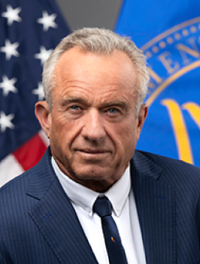
Kennedy Jr.
The federal health bureaucracy’s latest health advice deals with Tylenol, pregnancy, and a supposed link to autism and other neurodevelopmental disorders. It’s a controversial flag for the Trump administration to plant, but it’s on-brand for Health and Human Services Secretary Robert F. Kennedy Jr., who knows precisely what he’s doing.
RFK Jr. is relying on select studies and questionable experts for his autism claims, using the bully pulpit of federal power to issue new warnings and guidance that will prove fodder in future lawsuits. Kennedy made his career as a tort lawyer suing companies, halting projects, and twisting science to achieve symbolic courtroom wins that reaped his firm hundreds of millions of dollars.
Now that he’s in control of a federal agency, his most recent announcement will provide an immediate boost for a specific group to which he once belonged: plaintiff lawyers who chase class-action lawsuits against American companies.
Even Senator Elizabeth Warren (MA-D), who herself has received six-figures in campaign contributions from the Thornton Law Firm, one of New England’s largest, identified this exact concern in her initial interrogation of RFK during his confirmation hearings.
The claim that Tylenol's primary active ingredient, acetaminophen, is a culprit for these disorders might feel out-of-the-blue to most Americans, but for legal analysts who have consumed decades of legal advertising and litigation recruitment campaigns, it’s an old story.
Mass tort and multidistrict litigation against Tylenol’s alleged links to these disorders have escalated in recent years, culminating in a large federal lawsuit in the Southern District of New York that combined 441 separate cases.
The goal was to extract a record penalty or settlement amount from Tylenol maker Kenvue, a spin-off of Johnson & Johnson.
Those efforts hit a brick wall in December 2023 when a federal judge issued a 148-page opinion disqualifying all of the expert witnesses provided by the plaintiffs who claimed a link, labeling their testimonies as “incomplete, unbalanced, and at times misleading”.
The opinion highlighted that five expert witnesses paid by the plaintiff attorneys cherry-picked the studies to make their claims, downplaying those that didn’t show causation while emphasizing evidence that fit their narrative. The court ruled the evidence could not be admitted.
In non-legal terms, the plaintiffs’ case was completely shredded. Since then, the firms involved have filed an appeal of the ruling, which is still ongoing and could deliver an opinion as early as November.
Oddly enough, RFK, President Trump, and FDA Commissioner Marty Makary highlighted research in their Oval Office press conference on Tylenol and autism by Andrea Baccarelli, dean of the T.H. Chan School of Public Health at Harvard University - the same expert witness the court shut down for being “sloppy” and misleading. To say nothing of being paid $150,000 for his testimony.
The Tylenol-autism announcement is made all the more curious by the fact that Kennedy Jr. was once the primary spokesman for one of the largest and most prosperous injury law firms in the nation.
By granting oxygen to these claims, RFK Jr.’s statements have already invigorated the same class-action law firms, which are practically giddy at the prospect of bringing new claims to court against Tylenol to try to force a settlement. These lawyers work on contingency fees, with some plaintiff fees reaching as high as 40% of total compensation. Most class-action members are left with pocket change.
Expect to see a new wave of legal advertising targeting plaintiffs for future cases that may take years to settle. Now is as good a time as any for Congress to consider putting some guardrails on how people can manipulate American courts.
As RFK’s reign at HHS continues, we know this will be far from the last medical and legal controversy to flood courtrooms. Without some reasonable limits, there’s no telling which drug, medicine, or common consumer product will be targeted next.


